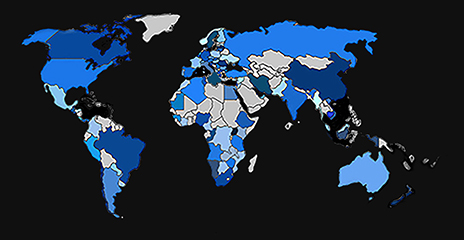
Twitter, Netflix, LinkedIn - today many have a second life online. But: What should happen to the accounts after death?
Desperate search. Every three minutes, a Facebook user dies in Germany. Those who write down during their lifetime which accounts and passwords exist and what should happen to the data in the event of death save the surviving dependents a lot of time and hassle.
In May 2020, the Protestant pastor Bernd S. passed away in Berlin. His analogue traces have been erased, but his digital ones still exist: the personal pages on Facebook and Instagram are still online - videos, comments, photos visible. After an estate contact informed about the death on the Facebook account of the pastor, the memories live on with the consent of the of the deceased. This was different in the case of Michael Ballack's (famous German football player) son, who recently died in an accident in Portugal: shortly after his death, the 18-year-old's Instagram account was already deleted.
According to German law, digital inheritance is on an equal footing with material inheritance. In other words, survivors entitled to inherit do not only inherit the analogue legacy, but also the digital legacy. This means that all rights of use and administration are transferred to the heirs, as are obligations from contracts, for example from digital subscriptions.
The heirs also have a claim against the operators of social networks to access the account of the deceased, including all the content stored in it - but only once the estate has been settled and a certificate of inheritance has been issued.
But those who write down during their lifetime what online presence they had and what is to be done with it after their death make it easier for the surviving dependents and enable quicker solutions.
Since nine out of ten Germans are active online, leaving behind many digital traces, the issue of digital inheritance concerns most of us.
The German government therefore recommends that every online user put in writing who should manage the digital inheritance and how personal data should be handled. It makes sense to appoint a trusted person in writing and to keep a printed list of all accounts, including passwords, in a safe place - or to store it as an encrypted document, perhaps on a USB stick.
The assumption of digital responsibility for the deceased becomes completely legally secure if a lawyer or notary drafts the power of attorney or if there is a will naming any authorised representative. If no one is named, all legal heirs have access - which might not always be desired.
Some social networks now take into account the fact that tens of thousands of their users die every day. In Germany, for example, a Facebook user dies every three minutes who has not previously specified what is to happen to the account after his or her death. This amounts to 375,000 users per year.
Oxford University has even calculated that by 2070 there could be more dead than living people registered on Facebook.
In the meantime, many companies are on the market that take over the digital estate service for the heirs - for appropriate payment, of course. They not only help with the search for accounts, but also find online bank accounts and share deposits at home and abroad. Especially when it comes to online accounts, one thing is clear: neither a trusted person nor one of several heirs may access the assets of the deceased without being asked.
In the case of money, which is kept digitally but also belongs to the analogue world, things are clearly regulated: It is divided according to the legal succession or the legacy of the deceased. The whole article can be read in German in “Der Tagesspiegel”, a leading Berlin-based newspaper.
